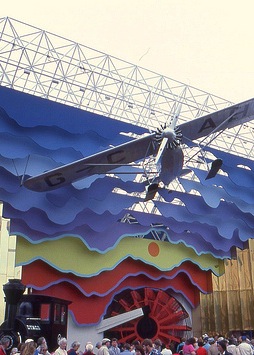Sunday, June 29, 1986.
IN THE 19TH CENTURY, authentic wilderness lands were visited only by adventurers. Today, multi-projector shows in both the Oregon and Yukon Expo pavilions promote the frontier as an exclusive tourist destination.
"Yukon has never been for everyone," says the native Indian narrator introducing the 12-minute Out of Silence show in the northern territory's 150-seat pavilion theatre. Produced by Scribbler's Ink of Vancouver, the 18-projector presentation works to evoke poet Robert Service's famous "spell of the Yukon."
After establishing the presence of a native population, producer-director Blair Shakell's presentation underscores the modern Yukon's adventurer tradition with photo images from the 1890s gold rush era. The notion that ''their ghosts still walk these hills'' is used to add extra thrills to the various physically demanding outdoor activities available to the modern visitor.
Out of Silence concludes with its own title song, a ballad of the north sung by tenor Glenn Yarbrough. Sample lyric: ''Wild and free / Yukon's calling me."
In a similar mood is Oregon Trails, the six-projector slide show presented in the Northwestern state pavilion's Gallery Theatre. Narrator Pat Hingle invokes a "spirit of adventure" in the nine-minute presentation produced by Portland's Traveling Image Company.
Again, effective use is made of Native American art and legends, as well as pioneer history in the development of the frontier tourism theme. Original music for the show was composed by songwriter John Trivers, once a member of the Vancouver rock band Prism.
The above is a restored version of a Province review by Michael Walsh originally published in 1986. For additional information on this archived material, please visit my FAQ.
Afterword: In 1999, 13 years after the curtain came down on Expo 86, songwriter Susan Shewan went to court in Ontario, claiming that the Yukon's Expo slogan "Yukon, the Magic and the Mystery" infringed upon her copyright. For Shewan, the eight-day hearing was the result of a process that began in the early 1990s, a protracted dispute that had drawn the attention of her member of Parliament, Dan McTeague, and been mentioned in Ottawa’s House of Commons.
According to a 1999 report by intellectual-property lawyer Diane Leduc-Campbell, Shewan had moved to the Yukon in 1977 and "the next year wrote a folk song entitled "Yukon Magic and Mystery." She sang it at musical events, including the 1979 Vancouver Folk Festival. Earlier in 1979, she had recorded her song in the CBC Northern Service studios in Whitehorse, and it received regular air play on the CBC North radio station.
Shewan ended her performing career in 1983, and returned to Toronto in 1984. In 1999, Out of Silence's Vancouver-based director Blair Shakell testified that he’d never heard of Shewan or her song. In his detailed 1999 judgment, Ontario Supreme Court Justice Todd Archibald sympathized with “what from her perspective is a horrible trespass upon her reputation,” but ruled against Susan Shewan on the matter of copyright infringement. That same year, Yukon blogger Murray Lundberg later noted, Yukon Tourism changed its slogan from “Yukon — the Magic and the Mystery” to “Canada’s True North.”
See also: The nine articles included in this, the second of four Expo 86 special reports, explore the pavilions of:
|
14: Expo 86 British Columbia 15: Expo 86 Canada/Washington State 16: Expo 86 Canada 17: Expo 86 California 18: Expo 86 Mexico/Cuba/USA |
